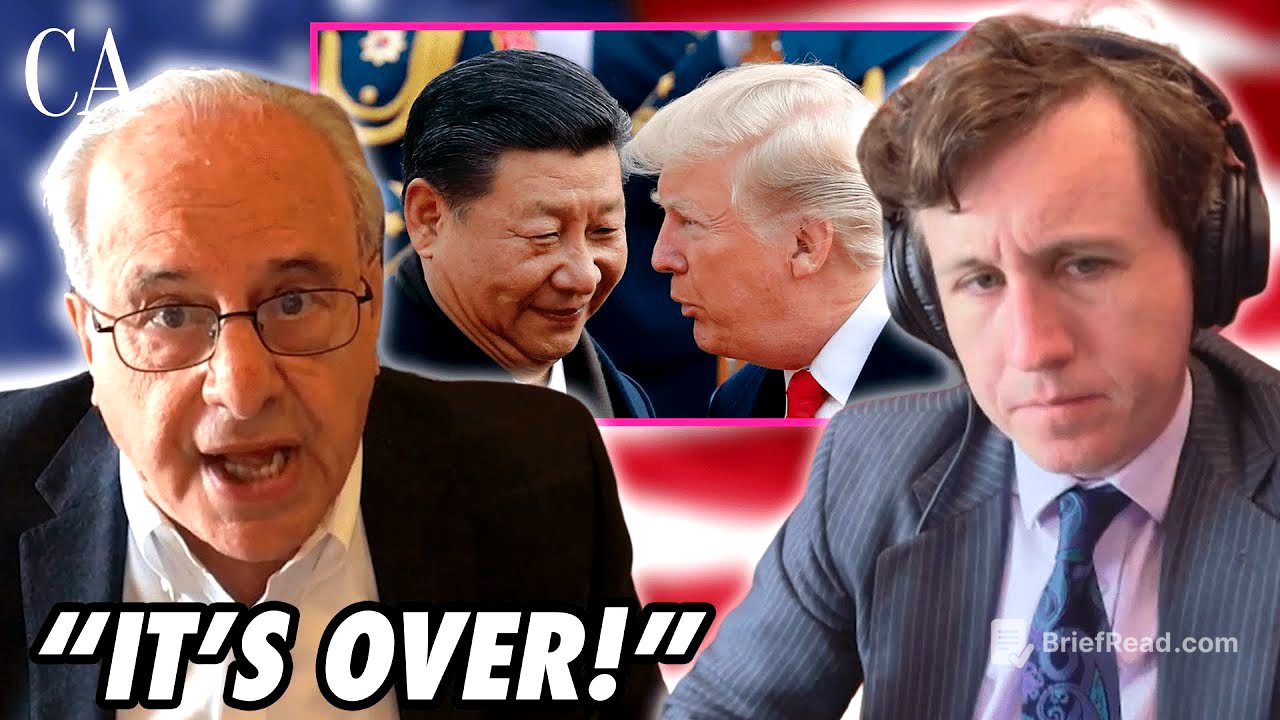TLDR;
Richard Wolf, a Marxist economist, discusses how economics is often made unnecessarily complex, obscuring basic realities like power dynamics in the workplace. He critiques mainstream economics for failing to predict economic crises and for promoting a flawed understanding of capitalism. Wolf also addresses the decline of the American empire, Trump's economic policies, and the economic impact of immigration, offering a Marxist perspective on these issues.
- Economics is often made unnecessarily complex, obscuring basic realities.
- Mainstream economics fails to predict economic crises and promotes a flawed understanding of capitalism.
- The American empire is in decline, and Trump's economic policies are a desperate attempt to preserve its power.
Why Economics Is Designed to Confuse You [0:00]
Richard Wolf argues that economics, like law, often takes simple concepts and makes them unnecessarily complex, creating confusion and a lack of economic literacy. He uses the analogy of lawyers complicating a simple contract dispute to explain how economists obscure basic economic realities. Wolf points out that everyone understands the power dynamics in the workplace, where employers have the power to hire and fire, yet mainstream economics often fails to incorporate this reality into its models. He criticizes Milton Friedman's argument that economic models don't need to be realistic as long as they make accurate predictions, noting that economic models consistently fail to predict crises like the 2008 crash or the 2020 pandemic. While Marxism can help understand the inherent instabilities of capitalism, it doesn't predict the timing or severity of crises.
What Marxism Actually Reveals About Capitalism [11:53]
Wolf explains that mainstream economics presents capitalism as a harmonious partnership between workers, capitalists, and landlords, each contributing and receiving in proportion to their contribution. Marxism, however, views this as a deceptive narrative. Marxists argue that workers sell their labor power and do not own the results of their work, which are appropriated by the capitalist. The capitalist hires workers only if the value they add is greater than the wages they are paid, creating a system of exploitation. This perspective is often suppressed because it can lead to working-class anger and challenges the established order. Marx dedicated his life to understanding why capitalism failed to deliver on its promises of liberty, equality, and fraternity, concluding that capitalism has structural impediments that prevent it from doing so.
Capitalism Isn’t What You Think It Is [22:26]
Wolf clarifies common misunderstandings about capitalism, emphasizing that private property and markets are not unique to capitalism and can exist in other systems like slavery. He argues that the ownership of modern corporations is a collectivity of shareholders, not private individuals. Wolf also critiques the idea that socialism is simply when the government owns and operates enterprises, as in the Soviet Union. He asserts that true socialism involves democracy at work, where workers collectively own and control the means of production, eliminating the employer-employee divide. This vision of socialism aims to create work that is more socially meaningful, less destructive, and more secure, allowing individuals to fully develop their potential.
Capitalism’s “Success” Story Is a Lie [30:55]
Wolf challenges the common defense of capitalism that it has produced vast prosperity, arguing that every gain in living standards, such as better diets, working conditions, and housing, was achieved through struggles against capitalist opposition. He uses the example of the minimum wage in the United States, which was passed despite fierce opposition from the capitalist class and has been eroded over time due to their continued efforts. Wolf contends that capitalism often claims credit for improvements that occurred in spite of it, due to the efforts of workers and social movements.
The End of American Empire [36:48]
Wolf discusses the decline of the American empire, noting that this topic is often avoided in mainstream political discourse. He argues that the United States replaced the British Empire after World War II, but its dominance is now waning. Trump's "Make America Great Again" agenda is seen as a desperate attempt to preserve American power, but his policies are unlikely to succeed. Wolf suggests that the American government is acting out of desperation, which can be dangerous and troubling.
Will Trump Cause A Recession? [44:35]
Wolf refrains from making predictions about Trump's economic policies but acknowledges that there is a small chance they could succeed. However, he believes that Trump's agenda primarily benefits the wealthiest Americans while harming the working class through deregulation and cuts to social programs. Despite this, many in the business community continue to support Trump, seeing him as their best shot at maintaining their position.
The Economics of Immigration [47:45]
Wolf critiques the anti-immigrant narrative promoted by Trump and others, calling it a cruel hoax. He argues that the idea that immigrants are the cause of America's economic problems is absurd, given that undocumented immigrants make up a small percentage of the population. Wolf points out that immigrants often take the worst jobs and live in the worst conditions, and their presence does not significantly affect the lives of most Americans. He attributes the rise of anti-immigrant sentiment to the deindustrialization of the United States and the linking of economic anxieties to civil rights and feminist movements by the right wing.





![The Epic Showdown with Milleniumon [Adventure 2020 Discussion] | Baby Flame Vol. 10](https://wm-img.halpindev.com/p-briefread_c-10_b-10/urlb/aHR0cDovL2ltZy55b3V0dWJlLmNvbS92aS9SXzE0THhNVVFHNC9ocWRlZmF1bHQuanBn.jpg)



